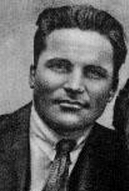This article needs additional citations for verification .(June 2015) (Learn how and when to remove this template message) |
The Decree about Arrests, Prosecutor Supervision and Course of Investigation No. 81 was issued jointly by the Sovnarkom and Central Committee of the Communist Party of the Soviet Union (undersigned by Molotov and Stalin) on November 17, 1938.

The Central Committee of the Communist Party of the Soviet Union was the executive leadership of the Communist Party of the Soviet Union, acting between sessions of Congress. According to own party statutes, the committee directed all party and governmental activities. Its members were elected by the Party Congress.

Vyacheslav Mikhailovich Molotov was a Soviet politician and diplomat, an Old Bolshevik, and a leading figure in the Soviet government from the 1920s, when he rose to power as a protégé of Joseph Stalin. Molotov served as Chairman of the Council of People's Commissars (Premier) from 1930 to 1941, and as Minister of Foreign Affairs from 1939 to 1949 and from 1953 to 1956. He served as First Deputy Premier from 1942 to 1957, when he was dismissed from the Presidium of the Central Committee by Nikita Khrushchev. Molotov was removed from all positions in 1961 after several years of obscurity.

Joseph Vissarionovich Stalin was a Georgian revolutionary and Soviet politician who led the Soviet Union from the mid–1920s until 1953 as General Secretary of the Communist Party of the Soviet Union (1922–1953) and Premier (1941–1953). Initially presiding over a collective leadership as first among equals, by the 1930s he was the country's de facto dictator. A communist ideologically committed to the Leninist interpretation of Marxism, Stalin helped to formalise these ideas as Marxism–Leninism, while his own policies became known as Stalinism.
It officially marked the end of the Great Purge. [1]

The Great Purge or the Great Terror was a campaign of political repression in the Soviet Union which occurred from 1936 to 1938. It involved a large-scale purge of the Communist Party and government officials, repression of wealthy landlords and the Red Army leadership, widespread police surveillance, suspicion of saboteurs, counter-revolutionaries, imprisonment, and arbitrary executions. In Russian historiography, the period of the most intense purge, 1937–1938, is called Yezhovshchina, after Nikolai Yezhov, the head of the Soviet secret police, the NKVD, who was executed a year after the purge. Modern historical studies estimate the total number of deaths due to Stalinist repression in 1937–38 to be between 681,692-1,200,000.
The decree declared that during 1936-1938 NKVD did a good job in cleansing the country of numerous "spies, terrorists, diversionists and wreckers <...> which provided a significant support for foreign intelligencies in the USSR..." The decree further noted that NKVD was both sloppy and the same time overzealous and put the blame on the "enemies of the people" who infiltrated NKVD. The decree formally banned Mass operations of the NKVD and ordered the strict accordance to the codes of criminal procedure and the supervision of the NKVD investigations by prosecutors.
Mass operations of the NKVD were carried out during the Great Purge and targeted specific categories of people. As a rule, they were carried out according to the corresponding order of the People's Commissar of Internal Affairs Nikolai Yezhov.
The order of the implementation of the Decree was detailed in the NKVD Order No. 00762 (Приказ НКВД СССР № 00762 «О порядке осуществления постановления СНК СССР и ЦК ВКП(б) от 17 ноября 1938 г.»).









